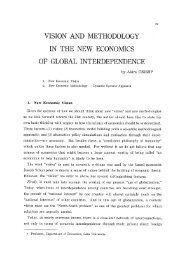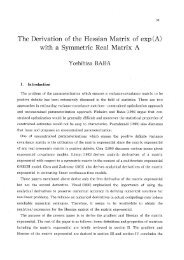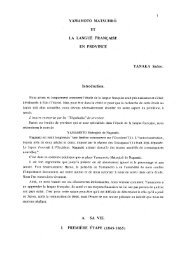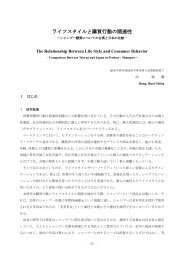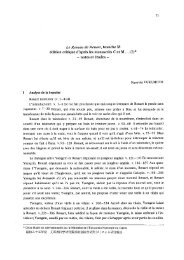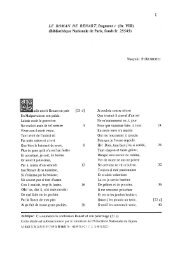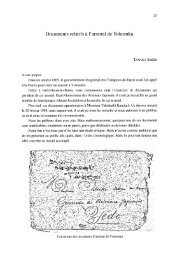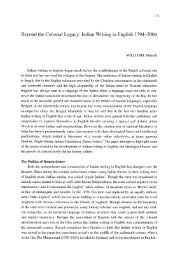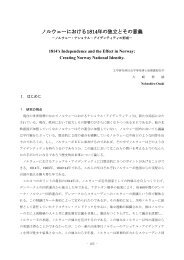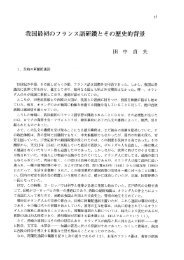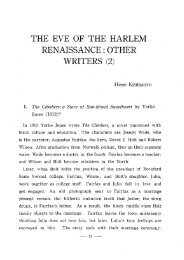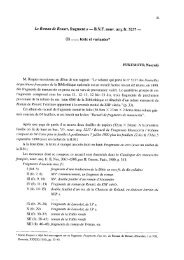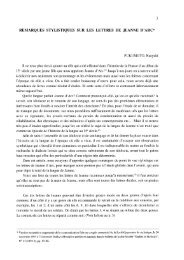New Historicism and Literary Studies - Soka University Repository
New Historicism and Literary Studies - Soka University Repository
New Historicism and Literary Studies - Soka University Repository
Create successful ePaper yourself
Turn your PDF publications into a flip-book with our unique Google optimized e-Paper software.
to control her sexually. Montrose reads the subtext of the play as an attempt to valorize<br />
patriarchal governance at the expense of the matriarchal. The virgin Queen assuages the typical<br />
fear of the Elizabethan male by being barren <strong>and</strong> not perpetuating matriarchal governance<br />
through conceiving a would-be daughter. The social production of the play reinforces the myth<br />
both of her virginity <strong>and</strong> barrenness by her real presence in it.10<br />
These examples raise many questions about new historicist practices. Is it possible for a<br />
literary critic to unmask the very ideology that is truly hidden in the text? And how can he find<br />
that the unmasked ideology is the truly hidden one <strong>and</strong> not his own political sympathy<br />
masquerading as evidence? Critics are alarmed at new historicists unmasking in literary texts<br />
only domination of woman, workers, slaves <strong>and</strong> peasants by power groups. <strong>New</strong> historicist<br />
interpretations look suspiciously neat <strong>and</strong> convenient as if their assumptions are not based on<br />
solid evidence but drawn from a priori conclusions which are later padded with selective<br />
textual <strong>and</strong> cultural evidence. <strong>New</strong> historicism seems to err in this regard. It leans heavily<br />
towards hypotheses which are emotionally preferable without the backing of substantial<br />
evidence, Convictions, prior to evidence, inspire brilliant arguments, but at times convictions<br />
can be misplaced (e.g., Greenblatt's interpretation of Durer's sketch in The Painted Manual,<br />
1525)." There seems to be a strong sympathetic leaning in new historicist method towards<br />
personal bias, causing opinions to become evidence.<br />
Eighth, new historicism does those very things in practice that it criticizes Marxism to be<br />
doing. Gallagher attacks the American Left professors who, since they could not subscribe to<br />
meta-narratives of Marxism (class conflict, economic power or state power), insist that political<br />
<strong>and</strong> economic power exist in daily life. And therefore resistance to it must be on a micro-level.<br />
And herein lies the problem. The entire Marxist tradition (Lukas, Adorno, Althusser, Gramsci,<br />
<strong>and</strong> even Marx) cautions us against subordinating theory to practical <strong>and</strong> political goals. And<br />
new historicism is doing exactly that. "Critical theories <strong>and</strong> interpretative frameworks," argue<br />
Gregory S. Jay <strong>and</strong> David L. Miller in After Strange Gods, "are necessary but unpresentable<br />
ghosts of authority—prerequisites to presence that are themselves incapable of appearing<br />
except within the shadow of their own effects."12<br />
Ninth, critics such as Brook Thomas point out that the idea of newness touted by `new'<br />
historicism in a postmodern world (that basically questions the possibility of newness) is itself<br />
retrogressive. Other critics who do not see anything new in the procedures of the new<br />
historicists pick up this argument. Critics of new historicism contend that new historicism has<br />
appropriated the critical practices of other disciplines such as anthropology, history <strong>and</strong> new<br />
Marxism repackaging them as new products <strong>and</strong> escaping the markers used to identify the<br />
original br<strong>and</strong>s.<br />
Tenth, located within the traditions of pragmatic historiography in the United States, new<br />
historicism battles with liberal humanists to resituate "great books" <strong>and</strong> reconstitute the<br />
pantheon of Western values, both in academia <strong>and</strong> society. Harold Bloom blames new<br />
historicism for seeking the historical roots of every literary object in sheer resentment. He<br />
inquires: Why don't they let literary object float in their own literary spaces? Why belittle<br />
literary texts by cutting them to size? Greenblatt finds Bloom's insinuation rather preposterous.<br />
The former asserts that the practice of new historicism to relate a text to its historical <strong>and</strong><br />
cultural context is to help readers to appreciate literature better. But Bloom remains<br />
119



